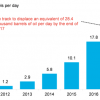Issues & Trends
| Kelp as the new kale, and a possible carbon fix “Blue carbon” is a term you might be hearing more often. It refers to marine vegetation that has an inherent ability to sequester carbon and mitigate the consequences of carbon dioxide (CO2) emissions. |
|
| India's Air Pollution Is Now Causing 1.1. Million Deaths Each Year India's air now rivals China's as the world's deadliest, according to a new study published Tuesday amid warnings that efforts to curb pollution from coal will not yield results any time soon. |
|
| New research highlights pipeline of investment opportunities in sustainable infrastructure across C40 cities Today, the C40 Financing Sustainable Cities Forum is being hosted in London by the C40 Cities Climate Leadership Group and the Greater London Authority, with the support of the Citi Foundation and WRI Ross Center for Sustainable Cities. |
|
| Can We Save the Oceans By Farming Them?
A small but growing number of entrepreneurs are creating sea-farming operations that cultivate shellfish together with kelp and seaweed, a combination they contend can restore ecosystems and mitigate the impacts of ocean acidification. |
|
| Happiness report: Norway is the happiest place on Earth - BBC News
|
|
| Ocean acidification may cause dramatic changes to phytoplankton Oceans have absorbed up to 30 percent of human-made carbon dioxide around the world, storing dissolved carbon for hundreds of years. As the uptake of carbon dioxide has increased in the last century, so has the acidity of oceans worldwide. Since pre-industrial times, the pH of the oceans has dropped from an average of 8.2 to 8.1 today. |
|
| This device pulls drinking water straight out of the air and it runs entirely on the sun’s energy
|
|
| How Much Oil Are EVs Displacing? | Bloomberg New Energy Finance EV's influence on global gasoline and diesel consumption is small but is increasing quickly. This short presentation aims to show BNEF's assessment of the fossil fuel displacement caused directly by EVs sold globally from 2011 to 2016. Fuel displaced by EVs on the road (thousand barrels per day) |
|
| UN chief Antonio Guterres warns of serious clean water shortages by 2050 UNITED NATIONS: Secretary-General Antonio Guterres warned that by 2050 global demand for fresh water is projected to grow by more than 40 per cent and at least a quarter of the world's population will live in countries with a "chronic or recurrent" lack of clean water. |
|
| By 2050, two-thirds of humanity will live in cities. How do we brace for impact?
By 2050, nearly two-thirds of humanity — more than 4 billion people — will live in cities. How should the world’s urban centers brace for impact — and ensure quality of life for the people who call them home? The answer? We need to make our cities smarter. |




 I
I